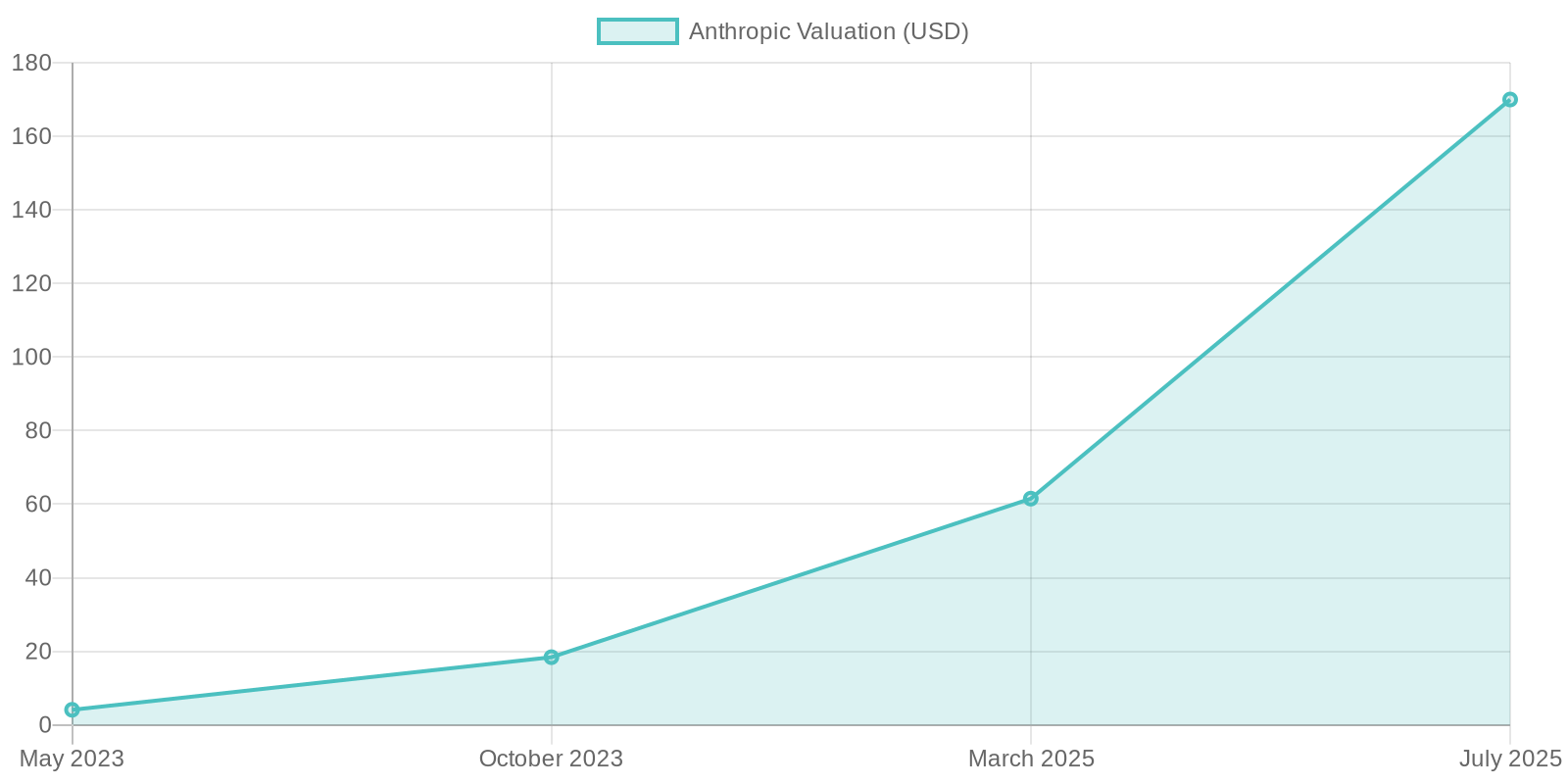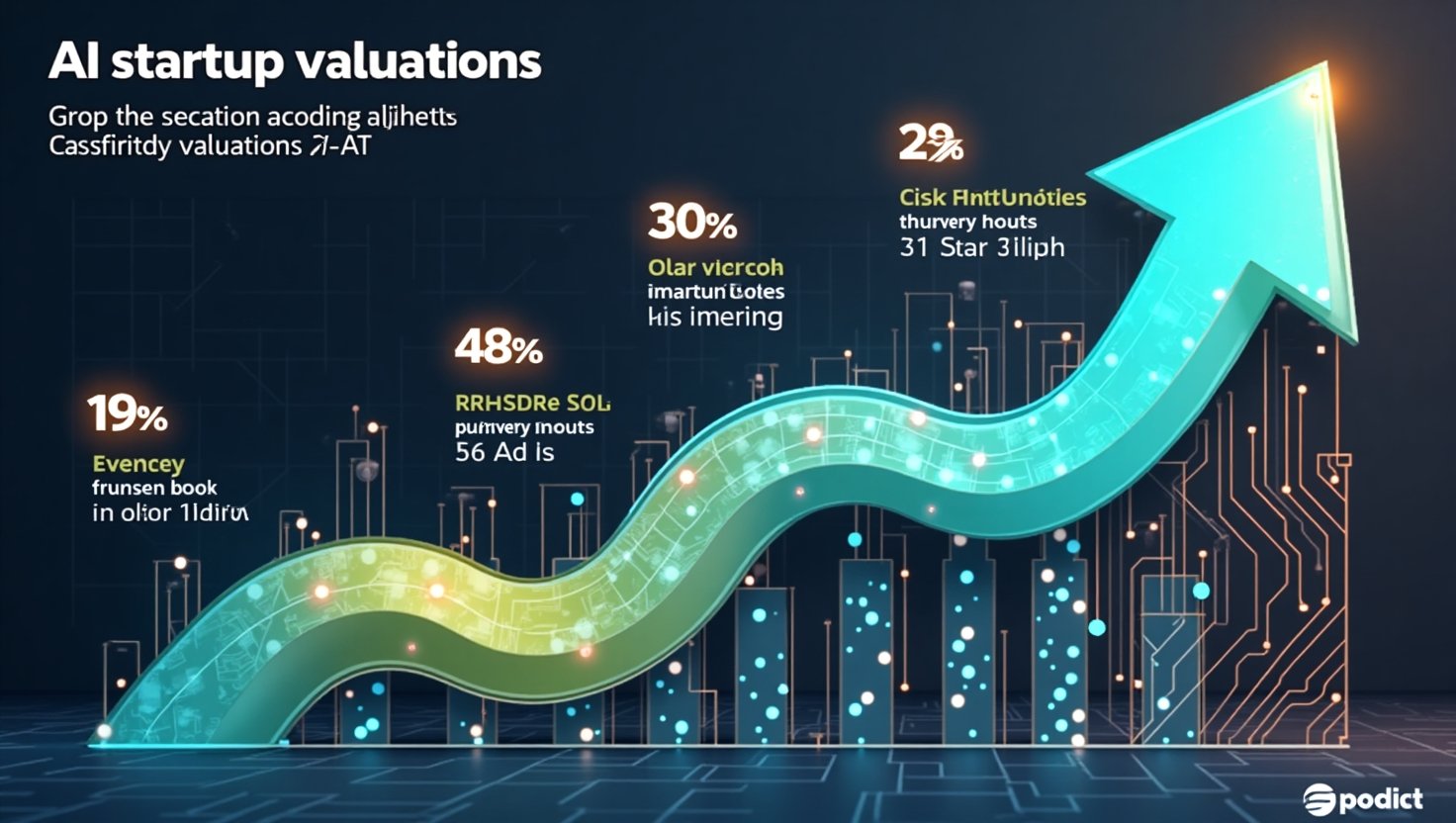In the rapidly evolving landscape of artificial intelligence investments, valuation dynamics play a pivotal role in shaping the future of technology funding. With revolutionary advancements and increasing demand for AI-driven solutions, companies like Anthropic are capturing attention not just for their innovative approaches but also for their staggering valuation prospects.
Recently reported to be nearing an impressive $170 billion, Anthropic is actively exploring funding avenues of between $3 billion to $5 billion, positioning itself at the forefront of a competitive market. The significance of such valuations cannot be overstated, as they reflect investor confidence in ethical AI funding and the potential for future growth in the tech industry.
As we delve into the intricacies surrounding Anthropic valuation, we uncover the factors influencing these financial benchmarks and the implications for the broader landscape of AI startups.
| Company Name | Funding Amount | Valuation | Notable Investors |
|---|---|---|---|
| Anthropic | $3B – $5B | $170 billion | Iconiq Capital, Lightspeed Venture Partners, Salesforce Ventures, Cisco Investments, Fidelity Management & Research Co. |
| OpenAI | $40 billion | $300 billion | SoftBank, Microsoft, Coatue, Altimeter, Thrive |
| Cohere | $500 million | $5.5 billion | Cisco, AMD, Fujitsu |
| Applied Intuition | $600 million | $15 billion | Andreessen Horowitz, Fidelity Investments, Kleiner Perkins, M12 |
| Scale AI | $1 billion | $14 billion | Amazon, Meta Platforms |
| Thinking Machines Lab | $2 billion | $12 billion | Andreessen Horowitz, Nvidia, AMD, Cisco, Jane Street |

Funding Statistics in AI Startups
In 2023, the funding landscape for AI startups showcased remarkable dynamism with substantial investments influencing the market. Some of the key statistics and trends observed include:
- Total Funding: AI startups garnered over $31 billion in investments globally, with the United States leading, securing more than 50% of this total.
- Dominance of Generative AI: Approximately 40% of all AI funding was directed towards generative AI companies, indicating a strong investor interest in this innovative sector.
- Notable Funding Rounds:
- OpenAI raised a significant $100 million, with contributions from major investors like Microsoft, Sequoia Capital, and Andreessen Horowitz.
- Cohere successfully secured $100 million in Series C funding led by Inovia Capital.
- Moveworks announced a $100 million Series D funding round, showcasing confidence from established investors.
- Mistral AI, a French startup, raised €105 million (approximately $117 million) achieving a valuation of €240 million.
- Shield AI saw a notable round of $200 million at a valuation of $2.7 billion, led by U.S. Innovation Technology Fund and Riot Ventures.
- Regional Insights: The U.S. maintains its stronghold in AI investments, while Europe and Israel collectively received about 20% of the funding allocated to generative AI over the last two years, highlighting the broad interest in the sector.
This data indicates a robust growth trajectory for AI startups, driven by significant venture capital funding and a shift toward innovative solutions in the industry.
Source: Analytics Insight, Reuters, Analytics India.
Anthropic’s Current Funding Efforts
Anthropic is working to raise between $3 billion and $5 billion in funding. This would boost its valuation to $170 billion. This funding effort shows the growing competition among AI startups. It reflects strong investor interest in developing technology that prioritizes safety in artificial intelligence.
Recently, the company succeeded in securing $3.5 billion in funding earlier this year, raising its valuation to $61.5 billion. Investors like Iconiq Capital are key players in these discussions and show confidence in Anthropic’s vision (CNBC).
However, these funding efforts involve ethical concerns expressed by Dario Amodei, the CEO. Anthropic was initially hesitant to work with Gulf state funding sources due to ethical issues. Yet, the need for substantial financial support has led to a reassessment of this stance. In a leaked memo, Amodei stated, “Unfortunately, I think ‘No bad person should ever benefit from our success’ is a pretty difficult principle to run a business on.” This reflects the internal tension surrounding potential funding sources (Wired).
Amodei understands the risks of accepting investment from authoritarian regimes, especially concerning technology that can shape societal structures. He highlighted that the Middle East offers critical capital for advancing AI development. Accepting this funding puts the company in a difficult position, balancing financial goals with ethical integrity in its practices (TechRepublic).
As Anthropic navigates these challenges, the outcomes of its funding strategy could significantly impact the AI sector. By preparing to secure major capital sources while attempting to uphold ethical commitments, the company must align its financial ambitions with its broader mission for responsible AI development. These decisions will shape the future of AI investments and showcase the complexities involved in ethical considerations within the tech industry.
The ongoing developments surrounding Anthropic’s funding efforts reflect not just the company’s future but also the changing landscape of AI funding, which increasingly intertwines with ethical dialogues.


The Impact of Sovereign Wealth Funds on Startup Funding
Sovereign wealth funds (SWFs) like the Qatar Investment Authority (QIA) and Singapore’s GIC are increasingly playing a critical role in funding startups, particularly in high-growth areas like artificial intelligence (AI). These investment bodies manage vast sums of national wealth and are able to make substantial commitments that can significantly influence startup valuations and market trends.
One of the primary advantages of funding from sovereign wealth funds is the ability to inject large amounts of capital into emerging companies, which can be especially crucial in capital-intensive sectors like AI. For startups like Anthropic, where valuations are skyrocketing — recently reported at $170 billion — the financial backing from SWFs can provide not just the funding required for growth but also an endorsement of credibility within the industry. This can bolster investor confidence and attract additional funding sources, creating a favorable cycle of investment and growth.
However, there are significant considerations when dealing with sovereign wealth funds. The ethical implications of accepting funding from entities associated with authoritarian regimes pose potential risks. For example, Dario Amodei, CTO at Anthropic, has voiced concerns regarding ethical principles and the influence of such capital on the direction of the company. The fear is that taking money from SWFs tied to controversial governments could lead to biases in AI development or misuse of technology.
Moreover, while partnerships with prominent sovereign wealth funds can elevate a startup’s profile, they can also lead to inflated valuations. The heavy influx of cash may skew a startup’s financial metrics, leading to unrealistic market expectations and creating volatility. An inflated valuation, while beneficial in securing more funds initially, can also result in challenges during future funding rounds or exit strategies, as the clear value proposition may become muddled amidst speculative investments.
In conclusion, sovereign wealth funds are reshaping startup funding landscapes, offering both substantial opportunities and significant pitfalls. As companies like Anthropic engage with these powerful financial entities, they must navigate the complex intersection of financial ambition and ethical integrity, ensuring that the drive for growth does not compromise their foundational values.
In conclusion, the landscape for AI startups, particularly those centered around breakthroughs in generative AI, is marked by intense competition and rapidly escalating valuations. Companies like Anthropic are emblematic of this trend, with an anticipated valuation reaching $170 billion through ongoing funding efforts. This significant increase not only illustrates the confidence investors have in such innovations but also underscores the pivotal role that ethical considerations play in shaping their future growth trajectories.
As funding dynamics shift with the increasing involvement of sovereign wealth funds, the balance between financial ambitions and ethical integrity becomes paramount. While the influx of capital from such entities may provide immediate financial gains and enhance credibility, it simultaneously raises important questions about the potential influence on AI development and governance. The challenge for startups will be to leverage this funding effectively while navigating the complex ethical landscape inherent in the technology sector.
Looking ahead, the overall market landscape will likely continue to evolve as more AI companies emerge and vie for funding. As startups grasp the significance of maintaining an ethical stance while pursuing ambitious growth targets, we may witness either a consolidation of power among a few dominant players or a diversification of investments into emerging entities committed to responsible practices. Therefore, the future for AI startups, driven by both visionary strategies and ethical frameworks, is set to be dynamic and transformative, promising innovations that could redefine technology development across industries.
Ethical Considerations in Funding
The quest for funding in the AI startup landscape is fraught with complex ethical considerations that must be navigated carefully. As companies strive to secure substantial investments, they often confront dilemmas involving the sources of that capital. Dario Amodei, CEO of Anthropic, has candidly reflected on these challenges, stating, “Unfortunately, I think ‘No bad person should ever benefit from our success’ is a pretty difficult principle to run a business on,” highlighting the precarious balance between maintaining ethical integrity and pursuing financial backing.
One significant ethical dilemma arises when considering investments from sovereign wealth funds, particularly those linked to authoritarian regimes. While such funding can offer a lifeline for startups, it raises critical questions regarding the integrity and motivations behind those investments. The capital supplied by these entities often comes with a taint of moral ambiguity, as they may underpin oppressive regimes whose values diverge significantly from those embraced by proponents of responsible AI development.
Moreover, the implications of accepting this type of funding extend beyond immediate financial gain. There is a genuine risk that the influences of these investors could shape the development and deployment of technology in ways that do not align with ethical standards of transparency and accountability. Companies might find themselves pressured to prioritize ROI over ethical considerations, leading to possible biases in AI algorithms and applications. This can foster distrust among consumers and the broader tech community, who increasingly advocate for responsible stewardship of transformative technologies.
As the field of AI evolves, founders and investors must engage in critical self-reflection and establish frameworks that guide their choices in funding sources. The pursuit of capital should not come at the cost of ethical commitments. Striking this balance is imperative, as it will define the trajectory of AI development in the coming years and determine the societal impacts of these technologies. In navigating these complex waters, startups like Anthropic must articulate their values and adhere to them, ensuring that their growth does not compromise the ethical principles they stand for. Upholding these commitments may ultimately serve not only to enhance their reputation but also to secure a sustainable future for the entire industry.
Share Your Thoughts!
We want to hear from you! The dynamics of AI funding and valuation are shifting rapidly, and your insights are invaluable. What do you think about the increasing role of sovereign wealth funds in AI startups like Anthropic? How do you perceive the ethical implications of their funding sources?
Join the conversation by sharing your thoughts in the comments below or engaging with us on social media. Let’s discuss how these factors shape the future of artificial intelligence!
Together, we can unravel the complexities of AI funding dynamics and understand their implications for innovation and society.
The complexities surrounding Anthropic’s funding efforts provide a crucial backdrop for understanding the broader implications of sovereign wealth funding in the startup ecosystem. Dario Amodei’s internal conflicts regarding potential investors highlight a relatable tension faced by many in the industry. Imagine an entrepreneur, passionate about creating technology with the promise of societal benefit, grappling with the realization that not all investors share the same values. In a moment of reflection, the leader of a burgeoning AI startup, much like Amodei, contemplates the moral ramifications of accepting funds from a regime known for human rights violations.
As the entrepreneur reviews the implications of these decisions, the fear of compromising their vision for responsible AI weighs heavily. The dire need for financial backing to drive innovation clashes with the responsibility of ensuring that their technologies do not inadvertently support oppressive systems. This poignant struggle encapsulates the ethical dilemmas that emerge when seeking funding from sovereign wealth funds.
With the stakes so high, it becomes essential for startups to navigate these waters thoughtfully, elevating the need for ethical standards as they pursue growth in a rapid and competitive market. This journey towards securing funding brings to light the critical choices that define not only the future of individual companies like Anthropic but also the ethical landscape of the entire AI industry.

